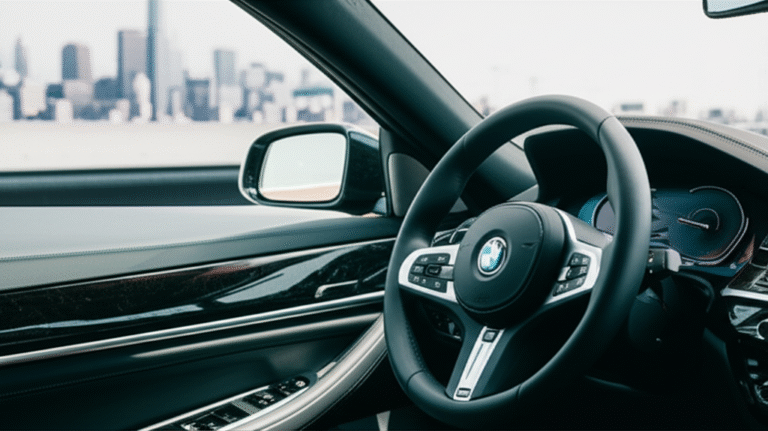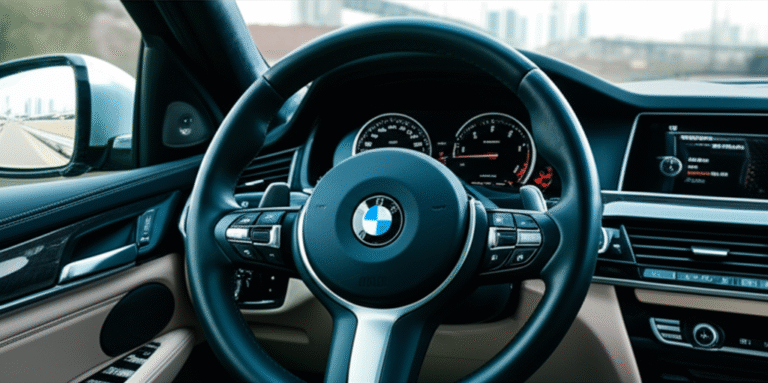BMW 5 Series Competitors: 7 Comparison Facts
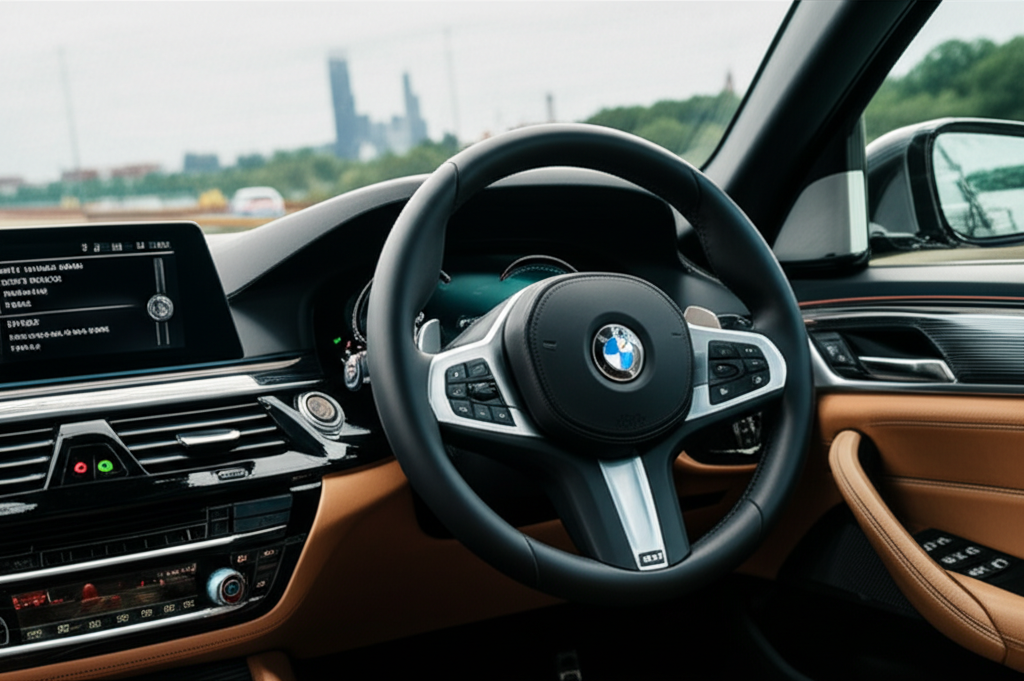
BMW 5 Series competitors are numerous, but understanding 7 key comparison facts helps you choose the best luxury sedan for your needs. We break down performance, tech, luxury, and value.
Key Takeaways
- Compare BMW 5 Series against rivals like Audi A6 and Mercedes-Benz E-Class.
- Analyze premium interior materials and advanced tech features.
- Evaluate powertrain options, from efficient hybrids to potent V8s.
- Consider driving dynamics and overall comfort levels.
- Assess long-term value, resale, and maintenance costs.
- Discover which competitor best suits your driving style and budget.
Choosing a new luxury sedan can feel like navigating a maze. The BMW 5 Series stands as a benchmark, but its rivals are equally compelling. You might wonder how the 5 Series stacks up against its closest competitors. We understand that the world of premium automobiles is packed with impressive options, each offering a unique blend of performance, technology, and comfort. It’s a decision that impacts your daily drives, your status, and your wallet. This guide is designed to cut through the noise, offering clear, fact-based comparisons to help you make an informed choice. Let’s dive into the specifics of BMW 5 Series competitors and what makes each one stand out.
BMW 5 Series Competitors: Understanding the Luxury Sedan Landscape
The BMW 5 Series has long been a darling of the luxury mid-size sedan segment, celebrated for its dynamic driving experience and upscale amenities. However, the automotive landscape is fiercely competitive, especially in the premium market. Manufacturers like Audi, Mercedes-Benz, Lexus, and Genesis invest heavily in creating vehicles that challenge the status quo. When you’re looking at the 5 Series, you’re likely also considering its direct rivals, which offer similar levels of sophistication and performance. These aren’t just cars; they’re statements of success and personal taste. Understanding the nuances between these vehicles is crucial for finding the one that truly resonates with your needs and desires. From the cutting edge of infotainment to the raw power under the hood, each competitor brings its A-game.
1. Powertrain Prowess: Engine Options and Performance
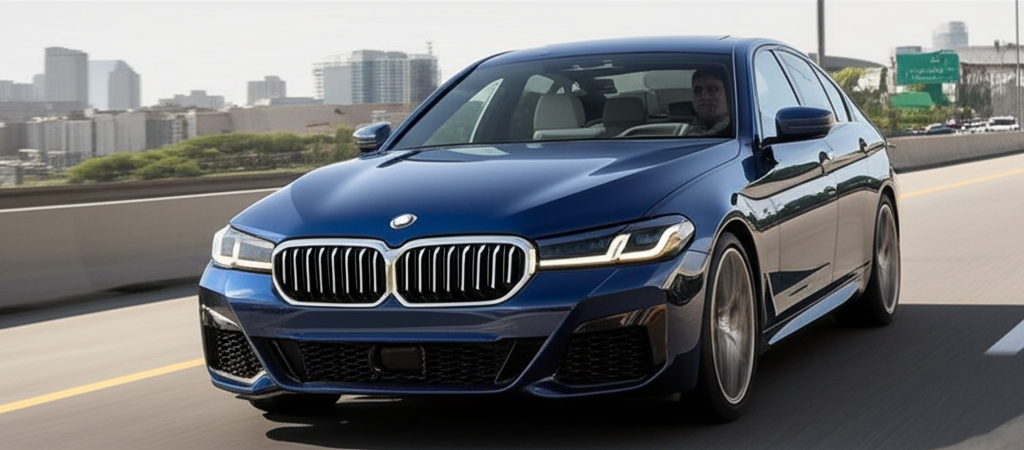
One of the most significant differentiators among luxury sedans is the range of powertrains offered. The BMW 5 Series typically provides a well-rounded selection, from efficient turbocharged four-cylinders to potent inline-six engines, with high-performance M variants pushing the envelope further. But how do its competitors measure up in terms of raw power, acceleration, and fuel economy? This is where the rubber meets the road for many discerning drivers.
Consider the Audi A6, which often features a smooth turbocharged V6 or a potent plug-in hybrid option. Mercedes-Benz counters with its E-Class, offering refined turbocharged engines, including those with mild-hybrid technology for improved efficiency and responsiveness. Lexus, known for its reliability and comfort, typically leans on sophisticated V6 engines or its renowned hybrid powertrains in the ES model, which competes slightly lower but shares much of the same clientele. Genesis, the rapidly ascending luxury arm of Hyundai, offers robust twin-turbo V6 and V8 options in its G80 model, providing a potent alternative.
When comparing, look beyond just horsepower figures. Consider the torque delivery, transmission smoothness, and overall driving feel. Some engines are designed for spirited driving, while others prioritize quiet, effortless cruising. The availability of all-wheel drive (xDrive for BMW, Quattro for Audi, 4MATIC for Mercedes-Benz) also plays a significant role in performance and all-weather capability, a critical factor for many drivers across the diverse climates of the USA.
2. Interior Elegance: Cabin Materials and Comfort
Step inside a luxury sedan, and you expect an environment that coddles you. The BMW 5 Series is renowned for its driver-focused cockpit, high-quality materials like supple leather and real wood or aluminum trim, and comfortable, supportive seating. However, its competitors are not shy about raising the bar in cabin luxury.
The Mercedes-Benz E-Class is often lauded for its opulent and serene cabin, featuring plush seating, exquisite wood veneers, and ambient lighting that creates a truly first-class atmosphere. Audi’s A6 offers a more modern and minimalist approach, with clean lines, excellent build quality, and a tech-forward design that feels both sophisticated and intuitive. The Lexus ES, while perhaps less overtly luxurious than its German counterparts, excels in build quality and offers exceptionally comfortable seats, making it a top choice for long-distance comfort. The Genesis G80 aims to out-luxury the competition with rich leather, real wood accents, and a striking design that feels more expensive than its price tag might suggest. Think about the ergonomics, seat adjustability, and the quietness of the cabin at speed – factors that become increasingly important on your daily commute or road trip across America.
3. Technology and Infotainment: Staying Connected and Entertained
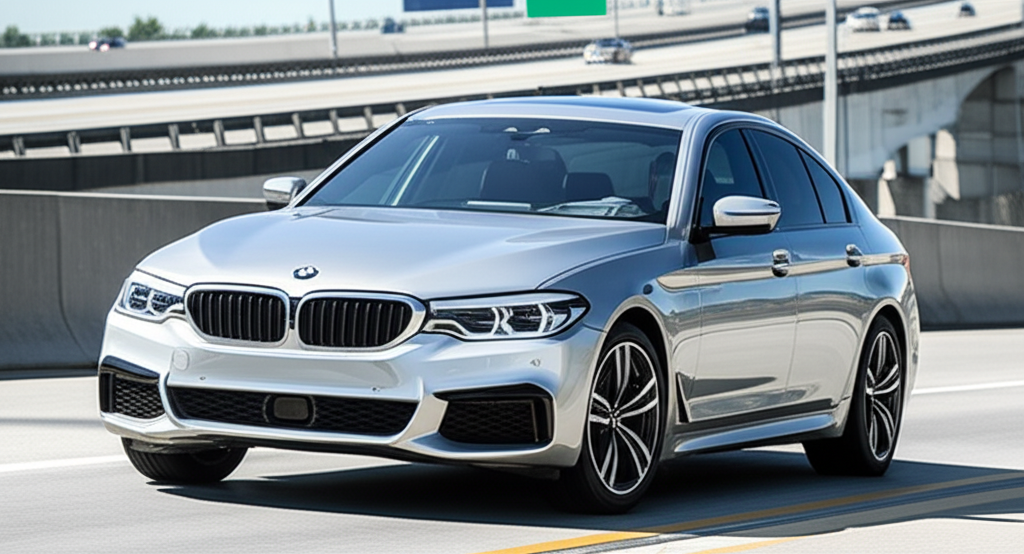
In today’s connected world, a car’s technology suite is as important as its engine. The BMW 5 Series features its iDrive infotainment system, which is known for its rotary controller and responsive touchscreen, offering features like Apple CarPlay, Android Auto, and advanced navigation. But how do the other players in this segment compete?
Audi’s MMI Touch Response system in the A6 is a dual-screen setup that is sleek and highly customizable, though it can have a learning curve. Mercedes-Benz’s MBUX system in the E-Class is a standout, featuring large, vibrant displays, intuitive voice control (“Hey Mercedes”), and augmented reality navigation that can overlay directions onto a live camera feed. Lexus offers its Lexus Interface system, which is a significant improvement over older iterations, with a standard touchscreen and integration with Apple CarPlay and Android Auto. Genesis utilizes its own user-friendly infotainment system, often with a large, clear touchscreen and easy-to-navigate menus. When evaluating technology, consider ease of use, screen responsiveness, the comprehensiveness of smartphone integration, and the availability of advanced driver-assistance systems (ADAS) like adaptive cruise control, lane-keeping assist, and blind-spot monitoring.
The National Highway Traffic Safety Administration (NHTSA) provides valuable information on vehicle safety ratings and the effectiveness of ADAS technologies, which can help you make a more informed decision about the technology best suited for your driving needs in the U.S. NHTSA.gov
4. Driving Dynamics: Sporty vs. Serene Experience
BMW’s reputation is built on the “Ultimate Driving Machine” ethos, and the 5 Series generally lives up to that. It strikes a balance between agile handling, responsive steering, and a comfortable ride. However, the definition of a “good drive” varies, and competitors offer different takes on this crucial aspect.
The Audi A6 leans towards a more composed and planted feel, with its Quattro all-wheel-drive system providing exceptional grip and stability, making it feel secure in all conditions. The Mercedes-Benz E-Class typically prioritizes a supremely comfortable and refined ride, smoothing out road imperfections with impressive ease, making it ideal for long-distance cruising. Lexus, particularly the ES model, excels in its smooth, quiet, and comfortable ride quality, focusing on effortless transportation rather than outright sportiness. Genesis’s G80 offers a compelling blend, providing a comfortable ride that can also feel surprisingly capable when the road gets twisty, especially with its more powerful engine options.
When comparing, consider what you value most. Do you want a car that feels engaging and connected to the road, or one that insulates you from it? Test drives are absolutely essential here, allowing you to feel the differences firsthand on various road surfaces common in the U.S.
5. Size and Space: Practicality in the Premium Segment
While all these vehicles are mid-size luxury sedans, their interior dimensions and cargo capacities can differ. The BMW 5 Series offers a good balance of passenger space and a reasonably sized trunk. However, if maximum practicality is a priority, understanding these differences is key.
Generally, these sedans offer ample legroom and headroom for front passengers. Rear-seat space can vary, with some models offering slightly more legroom than others, which is important if you frequently carry adult passengers or use child seats. Trunk volume is also a consideration, especially for those who travel frequently or have specific cargo needs. For instance, the Mercedes-Benz E-Class and Audi A6 often provide competitive trunk space. The Lexus ES, while comfortable, might offer slightly less trunk space than some rivals, particularly if configured with a more complex hybrid system. Genesis G80 typically provides generous passenger and cargo space, aiming for a value-for-money proposition in terms of size and features. Always check the specific dimensions and cargo volume figures for the model year you are considering, as these can vary.
BMW 5 Series Competitors: Key Specifications Comparison
| Feature | BMW 5 Series | Audi A6 | Mercedes-Benz E-Class | Lexus ES | Genesis G80 |
|---|---|---|---|---|---|
| Typical Base Engine | 2.0L Turbo I4 | 2.0L Turbo I4 | 2.0L Turbo I4 (Mild Hybrid) | 3.5L V6 or 2.5L I4 (Hybrid) | 2.5L Turbo I4 |
| Available Upgrade Engines | 3.0L Turbo I6, V8 (M) | 3.0L Turbo V6 | 3.0L Turbo I6 (Mild Hybrid), V8 (AMG) | 3.5L V6 (Hybrid) | 3.5L Twin-Turbo V6 |
| Drivetrain Options | RWD, AWD (xDrive) | FWD, AWD (Quattro) | RWD, AWD (4MATIC) | FWD, AWD | RWD, AWD |
| Infotainment Screen Size (Base) | 12.3 inches | 10.1 inches | 12.3 inches | 8.0 or 12.3 inches | 14.5 inches |
| Typical Cargo Volume (cu. ft.) | Approx. 18.7 | Approx. 13.7 | Approx. 13.1 | Approx. 16.7 | Approx. 16.1 |
| Focus | Sporty Handling, Tech | Refined Tech, Quattro Grip | Opulent Comfort, Tech | Comfort, Reliability, Efficiency | Value, Bold Design, Performance |
6. Reliability and Maintenance: Long-Term Ownership Costs
When investing in a luxury vehicle, long-term reliability and the cost of ownership are crucial considerations. While German luxury brands are known for their performance, they can sometimes come with higher maintenance and repair costs compared to their Asian counterparts. This is a significant factor for anyone living in the USA, where the cost of living and vehicle upkeep can be substantial.
Lexus consistently ranks at the top for reliability from organizations like Consumer Reports and J.D. Power. This reputation for dependability can translate into lower long-term maintenance costs and fewer unexpected repairs. Genesis has also been making significant strides in reliability, benefiting from Hyundai’s engineering prowess and commitment to quality. Audi and BMW, while generally reliable, may have more complex systems that can be more costly to repair. Mercedes-Benz, similarly, offers incredible luxury and engineering but can command premium prices for parts and service. It’s wise to research the specific model years you are considering and look for data on common issues and average repair costs. Understanding the warranty coverage offered by each manufacturer is also a key part of this comparison.
For detailed consumer satisfaction and reliability data, resources like Consumer Reports are invaluable for U.S. consumers.
7. Price and Value Proposition: What You Get for Your Money
The luxury car market is competitive, and manufacturers are constantly adjusting their pricing and feature packages to offer compelling value. The BMW 5 Series is positioned as a premium offering, and its price reflects that. However, its competitors present different value propositions.
The Audi A6 and Mercedes-Benz E-Class often compete directly with the 5 Series, with similar starting prices and option costs. Their value lies in their brand prestige, engineering, and distinct driving characteristics. Lexus ES traditionally offers a lower starting price point than the 5 Series, providing a luxurious experience at a more accessible cost, though it may not offer the same level of sporty performance. The Genesis G80 is arguably the value leader in this comparison. It often comes with a more generous standard equipment list, a powerful engine, and a premium interior at a price point that typically undercuts its German rivals, making it a very attractive option for buyers prioritizing a lot of car for the money.
When comparing value, look beyond the sticker price. Consider the standard features included, the available options, warranty coverage, fuel efficiency, and anticipated resale value. A car that initially costs more might offer better long-term value through lower depreciation or fewer maintenance expenses.
Pro Tips
Do Your Homework on Resale Value: Luxury cars can depreciate quickly. Research the projected resale value of specific models you’re considering. Vehicles with strong reliability records and high demand, like certain Lexus models, often hold their value better over time.
Frequently Asked Questions (FAQs)
What is the most reliable BMW 5 Series competitor?
Based on extensive testing and consumer surveys, the Lexus ES is consistently ranked as one of the most reliable luxury sedans, often surpassing its German rivals in long-term dependability.
Which competitor offers the most advanced technology?
The Mercedes-Benz E-Class, with its MBUX infotainment system, including impressive voice control and augmented reality features, is often considered a leader in automotive technology among the BMW 5 Series competitors.
Which competitor is the best for sporty driving?
While the BMW 5 Series is known for its sporty driving dynamics, the Audi A6 with its Quattro all-wheel drive and refined chassis offers a very engaging and stable driving experience. High-performance variants of these models, like the M550i or RS 7, are designed for ultimate performance.
Which competitor provides the most comfortable ride?
The Mercedes-Benz E-Class is widely regarded as offering one of the most comfortable and serene rides in its class, effectively isolating occupants from road imperfections. The Lexus ES is also a strong contender for ride comfort.
Is the Genesis G80 a good alternative to the BMW 5 Series?
Yes, the Genesis G80 is an excellent alternative, offering a highly luxurious interior, strong performance, and advanced features at a more competitive price point than many of its rivals, including the BMW 5 Series.
How do the maintenance costs compare between these cars?
Generally, German luxury brands like BMW, Audi, and Mercedes-Benz tend to have higher maintenance and repair costs compared to Japanese brands like Lexus or newer luxury brands like Genesis. Researching specific model year costs is recommended.
Which competitor offers the best value for money?
The Genesis G80 is often cited as offering the best value, packing premium features, strong performance, and luxury amenities at a price that typically undercuts its direct competitors like the BMW 5 Series, Audi A6, and Mercedes-Benz E-Class.
Conclusion: Finding Your Perfect Luxury Sedan Match
The BMW 5 Series is undoubtedly a formidable contender in the luxury mid-size sedan segment, celebrated for its engaging driving experience and sophisticated approach. However, its competitors offer compelling reasons to consider them as alternatives. Whether you prioritize the opulent comfort of a Mercedes-Benz E-Class, the tech-forward refinement of an Audi A6, the proven reliability and comfort of a Lexus ES, or the exceptional value and bold design of a Genesis G80, there’s a luxury sedan out there that perfectly aligns with your needs and preferences. By carefully comparing powertrains, interior appointments, technology, driving dynamics, practicality, long-term costs, and overall value, you can confidently make a choice that brings satisfaction to your daily drives across the USA and beyond.

